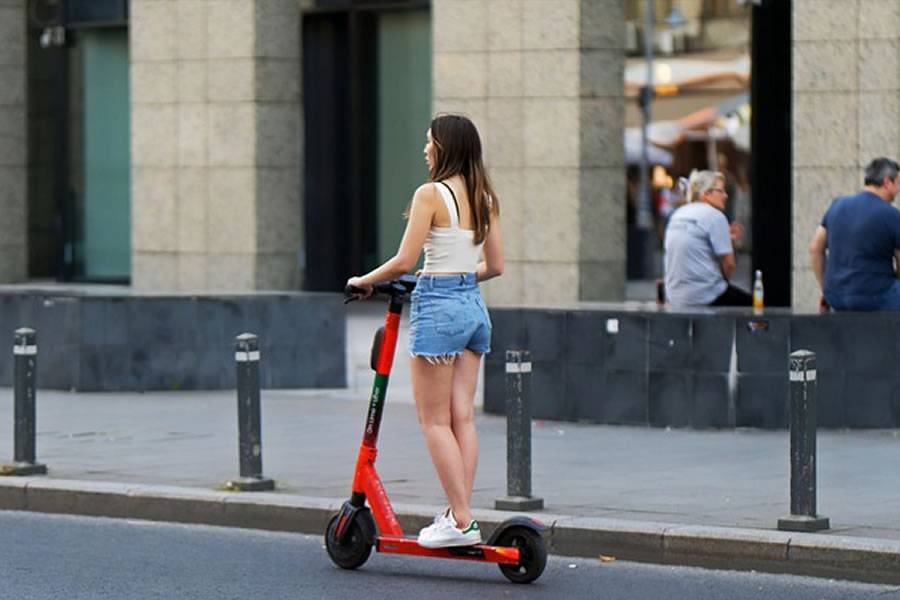Electric scooters: Are they a necessary evil or should they be banned?
- 04-09-2024
- National
- Canarian Weekly
The use of electric scooters has surged in popularity across the Canary Islands, whether it be for convenience for locals as a way to navigate the often congested streets, or rentals for holidaymakers. However, as their use has grown, so have the incidents involving them and the need for clear regulations to ensure safety and order on the roads and pavements of the archipelago.
In the Canary Islands, as in the rest of Spain, the use of electric scooters is regulated under the General Traffic Regulations set by the Dirección General de Tráfico (DGT). These rules apply across all regions of the country, including the Canary Islands.
1. Use on Pavements:
Electric scooters are NOT allowed on pavements. They are considered Personal Mobility Vehicles (PMVs) and must use bike lanes or, where these are not available, the road, adhering to the same traffic rules as bicycles.
Riding on pavements can result in fines, as it poses a danger to pedestrians.
2. Helmet Requirement:
As of now, wearing a helmet is not mandatory for electric scooter users over 18 years old, although it is strongly recommended.
However, helmet use is compulsory for riders under the age of 18.
3. Speed Limits:
Electric scooters are subject to a maximum speed limit of 25 km/h. Exceeding this speed can result in fines and penalties.
4. Alcohol and Drug Consumption:
The same laws that apply to other vehicles regarding alcohol and drug consumption apply to electric scooters. Users can be subjected to breathalyser tests, and violations can lead to fines or other penalties.
Potential Changes to the Laws
There has been growing concern among authorities and the public regarding the safe use of electric scooters. The significant increase in accidents involving these vehicles, resulting in injuries to riders and pedestrians, has sparked discussions about tightening regulations.
1. Mandatory Helmets:
One of the most anticipated changes is the potential introduction of a mandatory helmet law for all electric scooter users, regardless of age. This move is being considered to reduce the number of head injuries resulting from accidents.
2. Stricter Penalties:
There are also discussions about imposing stricter penalties for those who ride on pavements or exceed speed limits. This could include higher fines and the potential confiscation of scooters for repeat offenders.
3. Enhanced Enforcement:
Authorities are considering increasing the enforcement of existing laws, possibly through more frequent patrols and the use of technology, such as cameras, to monitor compliance with scooter regulations.
Public Opinion and Reaction
Public opinion on electric scooters in the Canary Islands is mixed. Many appreciate the convenience and environmental benefits these vehicles offer, especially in tourist areas where traffic congestion is common. However, there is also concern about the safety risks, particularly to pedestrians and vulnerable road users.
Recently there have been reports that private hospitals are refusing to treat people injured in a scooter accident if they were the rider as the insurance does not cover them. They will however treat you if you were the victim of being hit or injured by a scooter.
Local governments have been receptive to these concerns and are working on finding a balance between promoting sustainable transport options and ensuring public safety. Any changes to the laws would likely be introduced with a public awareness campaign to educate both scooter users and the general population.
The difficult part seems to be enforcing these rules, particularly helmets, with rental scooter users as they are not collected from a shop or depot like other rental vehicles, but on the streets and activated by mobile phones, so where do they get the helmet from?
Electric scooters are here to stay in the Canary Islands, as they offer a solution to urban mobility. However, as their use becomes more widespread, so too does the need for stronger regulations to ensure they are used safely and responsibly.
Other articles that may interest you...
Trending
Most Read Articles
Featured Videos
TributoFest: Michael Buble promo 14.02.2026
- 30-01-2026
TEAs 2025 Highlights
- 17-11-2025



























































